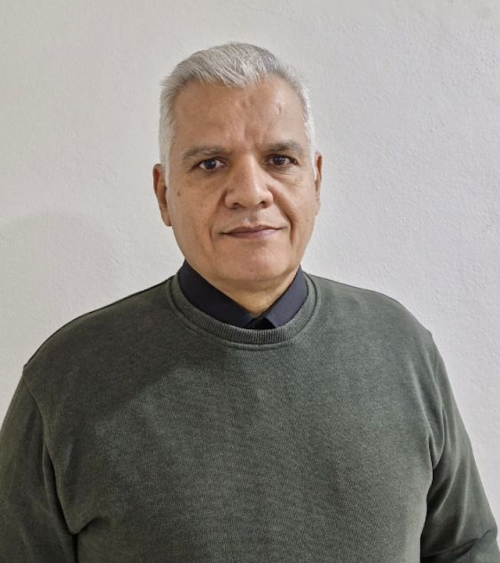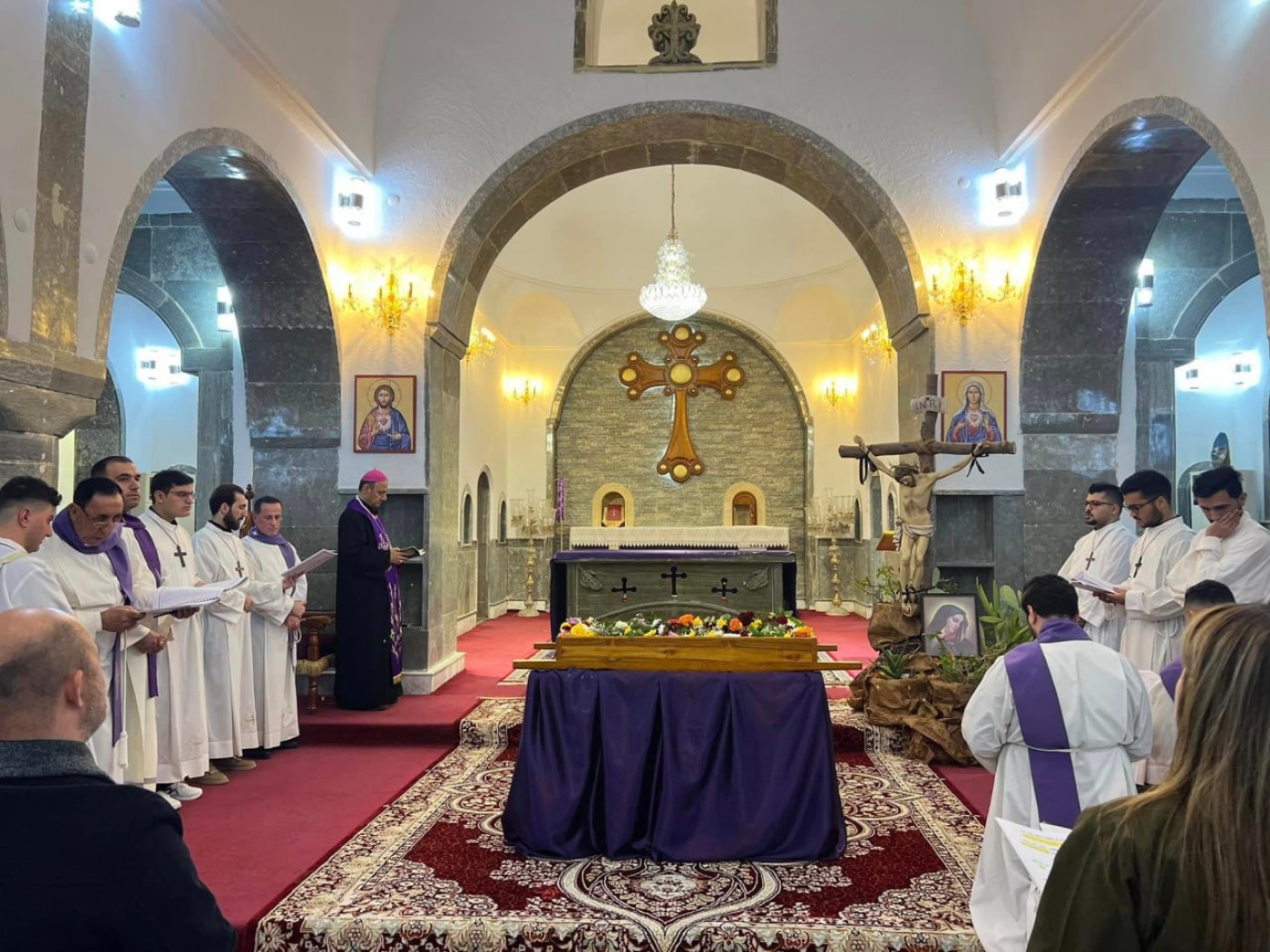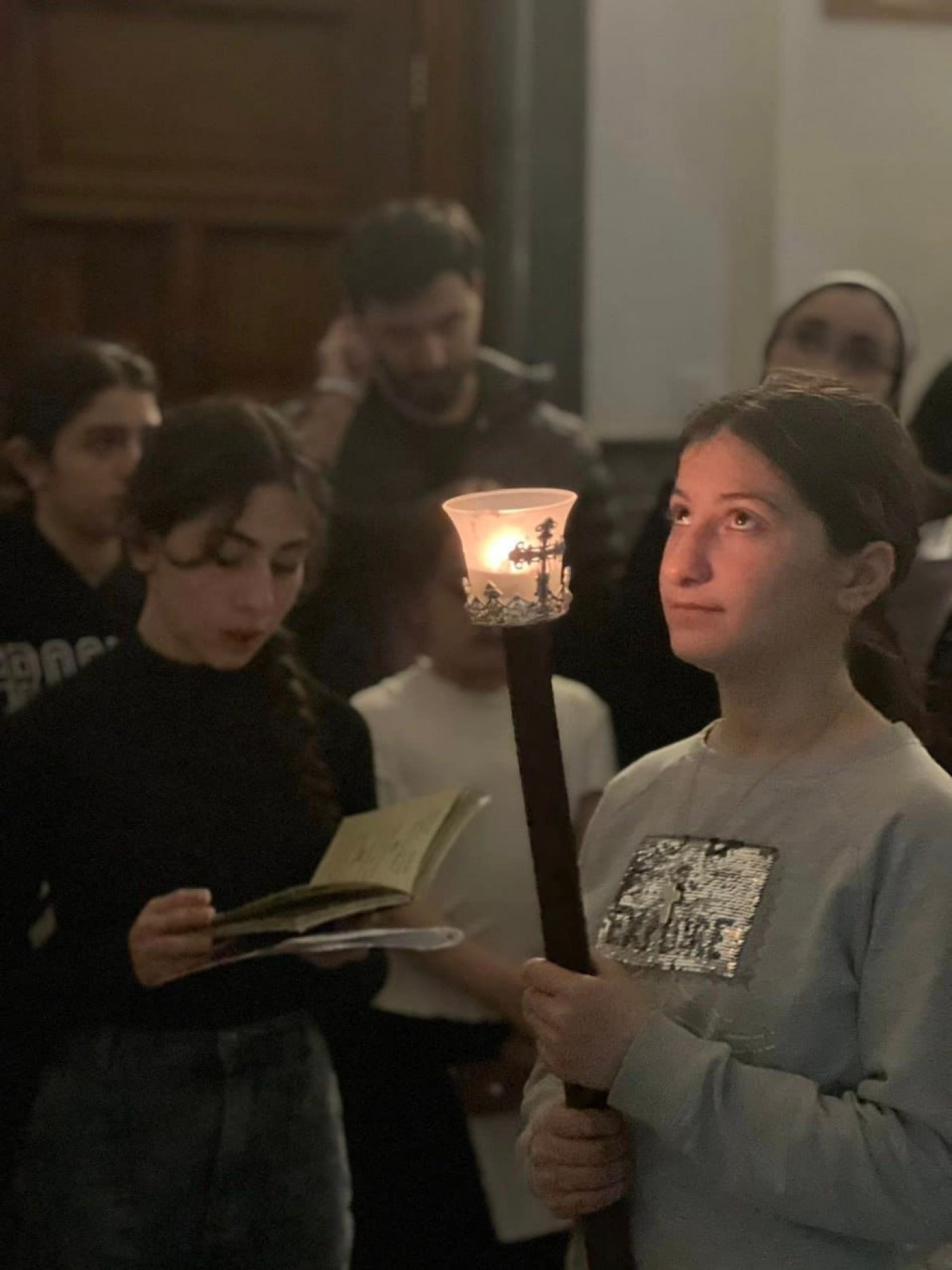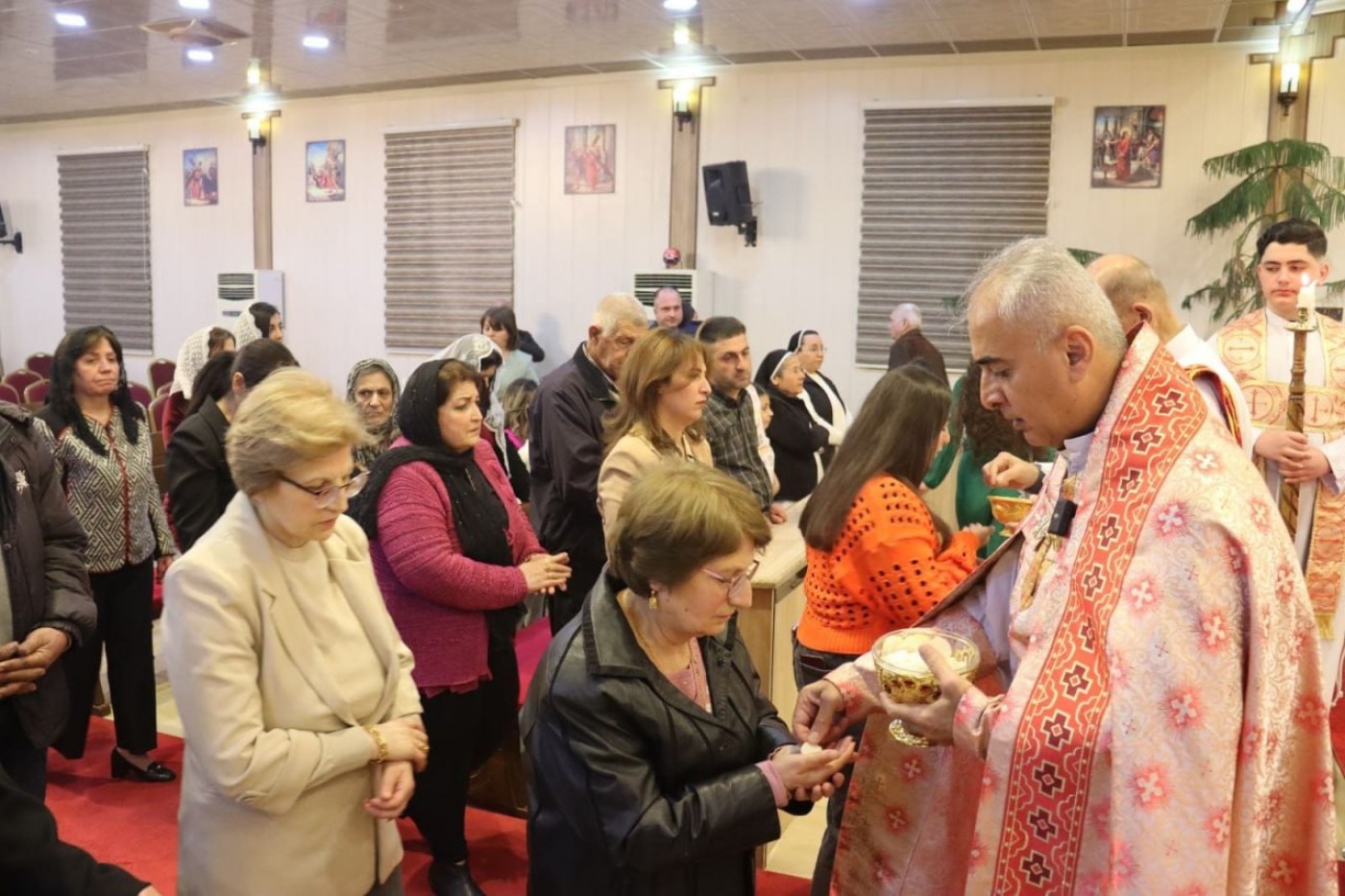In the Kurdistan Region, churches are bustling with religious services and masses as Easter approaches. Against the backdrop of calls for peace and security, Christian families are warmly receiving well-wishers from diverse religious and ethnic backgrounds.
Revival of the Spirit of Peace and Love
Yohanna Hermiz, a 51-year-old Christian from the village of Siji in western Duhok, has long been known for his tradition of offering sweets, colored eggs, and juices to his well-wishing guests during the holiday season, which includes Muslims and Yazidis alike. According to him, the celebration transcends religious boundaries, as it is embraced by all communities who come together to share in the festivities. For Hermiz, the holiday is not just a religious observance; it serves as a social occasion that fosters a sense of peace, love, and security, while also strengthening bonds among diverse religious and ethnic groups.
Sanaa Yelda, Yohanna's wife, highlights the significance of the holiday as a time for culinary delights and cherished traditions. She mentions the meticulous preparation of delectable traditional treats like sweets and pastries, alongside hearty meals, with the renowned dish "Bajah" taking center stage. Adding to the festive ambiance, they meticulously dye eggs, symbolizing the renewal of life, and offer them to well-wishers as tokens of celebration.
Easter, known as Pascha or Resurrection Sunday, holds immense significance as one of the most prominent and extensive Christian observances. Spanning three days, it commemorates the resurrection of Jesus Christ from the dead, occurring three days after his crucifixion and death as recounted in the New Testament scriptures.
The Chaldean Patriarchate Calls Off External Holiday Festivities
The Chaldean Patriarchate in Iraq has announced the cancellation of external Easter festivities for this year. In a statement released, they explained, "The Chaldean Patriarchate has decided to forgo all celebrations, media coverage, and receptions involving government officials in honor of Easter. Instead, the focus will be on prayer." This decision comes in solidarity with Patriarch Cardinal Louis Raphael Sako, who has been residing away from the historic headquarters in Baghdad for the past six months due to the selective withdrawal of Presidential Decree No. (147) of 2013. This withdrawal, lacking legal justification, appears to be a concession to a particular political entity, as openly stated in the media. Additionally, after four months, decrees appointing bishops for remaining churches were also rescinded.
The Patriarchate emphasized that the Patriarch has not been involved in any acts of violence, corruption, or the formation of unlawful militias, nor has he incited sectarian conflict. On the contrary, he has been a staunch defender of citizens' rights and full citizenship, actively fostering dialogue between religions, and providing assistance to hundreds of Iraqi families across the nation through the patriarchate and the Brotherhood of Love. They underscored that Patriarch Sako is renowned for his unwavering faith, sincerity, patriotism, and courage, and he does not cower in the face of corrupt individuals! The lies propagated by this well-known faction are ceaseless.
Moreover, they declared, "Our national expectations since the President assumed office have been for him to prioritize combating corruption and returning embezzled funds to the state treasury, rather than targeting peaceful Christians." The Patriarchate emphasized that it will never waver on its dignity, the dignity of the church, and the dignity of Christians, and will only yield to its faith and homeland.
In 2023, President Abdul Latif Rashid of Iraq made the decision to revoke a presidential decree issued in 2013 regarding the appointment of Patriarch Louis Sako as the Chaldean Patriarch of Iraq and the world, overseeing its endowments. In response to this decision by the Iraqi President, Patriarch of the Chaldean Church in Iraq and worldwide, Cardinal Louis Raphael Sako, chose to withdraw from Baghdad in July 2023 and transfer his authority to Erbil, the capital of the Kurdistan Region, citing ongoing political pressures. He deemed President Abdul Latif Rashid's actions, as per the presidential decree, unprecedented in Iraq's history.
Our existence threatened in Iraq…Kurdistan targeting endangers minorities
According to Christian sources, the situation for Christians in Iraq is worsening, with their presence in the country indirectly under threat. Haitham Petros, Vice President of Nuhadra Cultural Center, highlights that Iraqi Christians are an intrinsic part of ancient Iraqi civilizations, including the Chaldeans, Assyrians, and Syriacs. He notes that this community has never before experienced the level of assault, displacement, property seizure, and loss of rights currently being witnessed. Petros attributes this primarily to the rise of sectarianism, favoritism, and the emergence of armed militias falsely claiming to be Christian or Chaldean. These groups, he asserts, have gained prominence with backing from established entities aiming to undermine the position and influence of Christians in Iraq.
Petros views the withdrawal of the presidential decree affecting the patriarch and the Federal Court's decision to nullify the "quota" seats in the Kurdistan Parliament as unmistakable signs of targeting the Christian community and other minority groups. He emphasizes that all religious and ethnic factions enjoy stability in the Kurdistan Region, and the removal of quota seats is a covert attempt to destabilize social harmony in Kurdistan. Moreover, he notes a growing trend among Christians to contemplate emigration once more in light of these developments.
He further asserts that the majority of ethnic groups will abstain from participating in the Kurdistan Region elections in response to the Federal Court's decision to invalidate their representatives' seats in the Kurdistan Parliament. He argues that targeting the Kurdistan Region equates to targeting religious and ethnic minorities, as the region serves as a secure and stable environment for all its inhabitants.
The Kurdistan Region, particularly Erbil and Duhok, stands as a significant hub for the Christian community in Iraq, following the mass migration of Christians from other Iraqi cities. Sources from the Ministry of Endowments in the Kurdistan Region estimate that approximately 300,000 Christians reside in the area, with a total of 144 churches spread throughout the region.
Deep historical roots
Experts concur that Christians are integral to Iraq's historical fabric, with roots extending deep into its past. Documented evidence dating back to around 200 AD confirms the enduring Christian presence in Kurdistan and Iraq as a whole. Numerous Christian elites from Iraq have demonstrated their capabilities and made substantial contributions to scientific, medical, economic, commercial, cultural, artistic, and sporting domains. They have played pivotal roles in Kurdistan across various sectors and have made sacrifices within the Kurdish revolutionary movements against oppressive Iraqi regimes.
Grim outlook for minorities in Iraq
Khadr Domli, an expert in minority affairs, offers a bleak outlook on the future of minority groups in Iraq, attributing it to widespread distrust in the Iraqi government and uncertainty about the future, coupled with a pervasive sense of marginalization across various fronts. He asserts that these warning signs did not materialize out of thin air, with one of the most glaring examples being the Federal Court's decision to invalidate "quota" seats reserved for minorities in the Kurdistan Region Parliament elections. This decision underscores a disregard for the political representation of national and religious minority groups and their involvement in political processes and legislative affairs. Domli highlights other concerning indicators, such as the ongoing exodus of minority populations from Iraq; even if avenues for migration were opened, very few would opt to stay due to their perceived lack of parity with the majority. Regions in southern Iraq have witnessed a significant depletion of Christian, Yazidi, and Bahai communities, as many have opted to relocate abroad or to the Kurdistan Region, where a stronger sense of security, coexistence, and freedom prevails.
Domli also highlights another significant indicator, which is the erosion of trust following the ISIS assault on minority regions and the perpetration of genocide against the Yazidis, alongside war crimes and crimes against humanity targeting other minority groups, particularly Christians in Nineveh. These atrocities have also resulted in the destruction of the cultural heritage deeply rooted in Iraq. The underlying causes behind these indicators can be attributed to the absence of equitable justice mechanisms and the challenge of rebuilding trust.
Domli underscores that minority regions are undergoing significant demographic shifts and grappling with uncertain prospects, particularly in areas inhabited by Christians in the Nineveh Plain and Yazidis in Sinjar. These challenges underscore the bleak outlook for minorities, driven by two primary factors: firstly, a dearth of sincere political determination to foster a climate of diversity and pluralism within the nation, and secondly, a tendency to treat minority groups the same as the majority without acknowledging their unique circumstances, particularly concerning legislative measures and law amendments aimed at guaranteeing equality and equitable citizenship for all Iraqis.
Iraq encompasses four primary Christian denominations: the Chaldeans, adherents of the Church of the East who transitioned to Catholicism; the Syriac Orthodox; the Syriac Catholics; and the Latin Catholics. Additionally, there are the Assyrians, followers of the Eastern Church, along with smaller congregations of Armenian, Coptic, and Protestant faiths.
According to a census conducted in 1947, Christians comprised 3.1 percent of Iraq's population. By the 1980s, their numbers had grown to between one and two million. However, this percentage dwindled due to emigration throughout the 1990s, exacerbated by subsequent wars and worsening economic and political climates. Furthermore, a significant portion migrated abroad after 2003.





 Facebook
Facebook
 LinkedIn
LinkedIn
 Telegram
Telegram
 X
X


